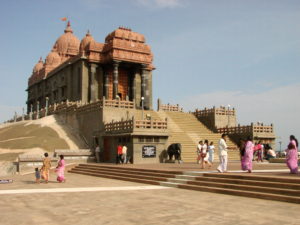The Hindu Concept of God – Jim Robinson
Try to explain the Hindu concept of God and suddenly RE teachers become cosmologists saying that God is a trinity represented by Brahma who creates the universe, Vishnu who preserves it and Shiva who destroys it (even though this means buying in to a cyclical rather than a linear view of a time-bound universe). Or else physicists, saying that, like clear white light refracted through a prism and emerging as all the colours of the rainbow the other side, so God is one but seen in many forms. Or else genealogists, comparing the different ways of seeing God as a mother, sister, daughter, cousin, neice and so on yet still the same person. Ultimately, there is only one God seen in many forms and ways, all forms of Brahman the Absolute, Ultimate Reality (not to be confused with Brahma the creator God of course).
In one sense this is fair enough, if you are also prepared to explain that this is only one of many ways of understanding God in Hinduism. If you want to be really clever about it you give this way of seeing God a name and call it Vedanta, or at least a form of it. Vedanta promotes the notion that ‘knowledge’ of God is achieved through a process of self-realisation, a process that is open to all. What is meant by God is Brahman, the Absolute, the Supreme and Ultimate Reality, although God is also referred to in less abstract terms by the epithet Ishvara meaning Lord. God-consciousness and self-realisation are bound up together in this system of thought which is based around the phrase ‘That thou art’ from Chandogya Upanishad 6.8.7. This phrase came to be interpreted differently by each of the 6 schools of Vedanta with a modern version being represented by the Advaita (monism, non-dualism) of Swami Vivekananda. In the Vishistadvaita (qualified non-dualism) and Dvaita (dualism) forms of Vedanta, bhakti to Vishnu and his incarnations is the path to moskha or liberation.

However, even Swami Vivekananda (19th c) was not averse to bhakti and meditation on a personal god with ‘form’ and ‘qualities’ rather than a ‘formless’ Absolute devoid of such things, at least initially. He realised that ‘God with form’ was easier for most people to grasp than ‘God without form’. Which is fine as Brahman can be seen as both a personal God ‘with form’ (Saguna Brahman) as well as ‘formless’ Absolute (Nirguna Brahman). Play around with this notion of God with or without form and you might get a sense of what Vivekananda meant when he said ‘A Hindu does not worship an image made of wood and clay, he sees consciousness within the earthen-ness and loses himself in it’. You also come to sense that it is something to do with consciousness, meditation, self-realisation, God-realisation.
Vedanta is a spiritual understanding of God represented by the Ramakrishna Vedanta Centre in Buckinghamshire and Jay Lakhani the education director of the Hindu Council UK. It is also an understanding that promotes community cohesion. Just as Swami Vivekananda encouraged religious tolerance in his world tours, stating that all religions strive towards the same truth, so Jay Lakhani is quoted as saying ‘All faiths must accept pluralism if we are to diffuse strife caused in the name of religion’ (Face to Faith 2007). As such it may be considered more ‘mainstream’ than the westernised version of bhakti represented by ISKCON and Bhaktivedanta Manor which promotes Krishna consciousness overall.
So if as an RE teacher you subscribe to the Vedantin view of God, then you are not alone in finding this an attractive route. Vedanta has been a major influence on many Western writers and philosophers such Aldous Huxley, T S Eliot, Voltaire and Nietzsche. But also be aware that for the majority of rural Hindus in India who worship not only a personal God (ishtadevata), but also a family God and a village God, the abstract philosophies of Vedanta, let alone the concept of Trimurti, may have little or no relevance. God ‘with form’ and personal or ‘God without form’ and abstract may be two sides of the coin and the notion of starting with the former before moving to the latter may give us some sense of the way that Hindus approach the concept of God as both personal Ishvara as well as abstract Brahman. It also highlights the need for us as RE teachers to be more aware of how we present the Hindu concept of God to our students and not to be tempted to oversimplify.